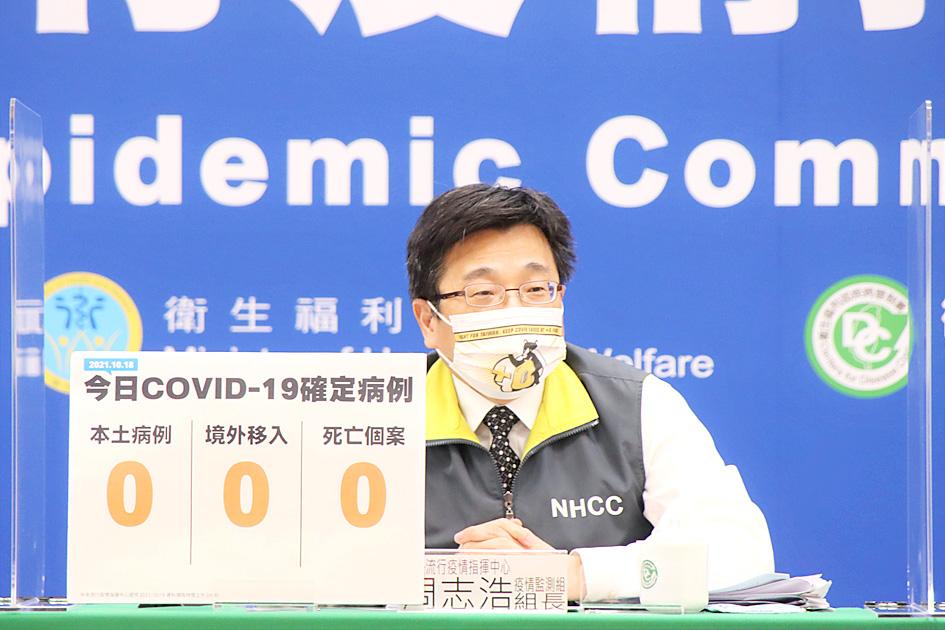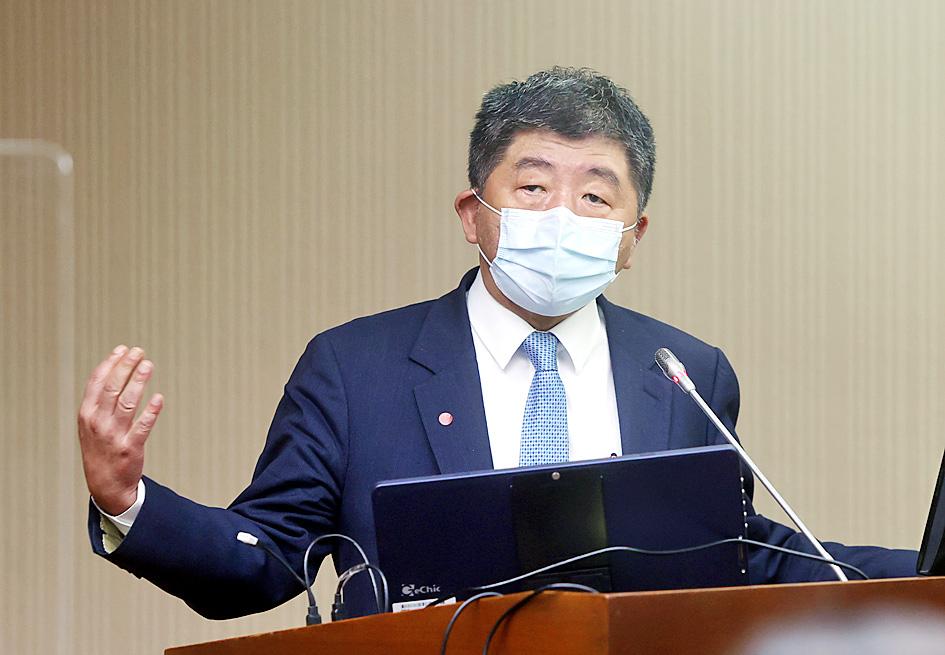Yesterday was the first time in 193 days that all daily COVID-19 case numbers returned to zero, with the Central Epidemic Command Center (CECC) reporting no new infections or deaths.
“This is the first time since April 8, which was 193 days ago, that we reported zero ... locally transmitted cases, imported cases and deaths,” said Centers for Disease Control (CDC) Director-General Chou Jih-haw (周志浩), who also heads the CECC’s disease surveillance division. “Of course, we are glad to see the numbers return to zero, but we need to work hard to keep up the good work.”
Chou said that a total of 356,483 COVID-19 vaccine doses were administered on Sunday and yesterday, bringing the nation’s first-dose vaccination rate to 62.4 percent, with 84.61 doses administered per 100 people.

Photo courtesy of the CDC
Separately at the Legislative Yuan in Taipei yesterday morning, a reporter asked Minister of Health and Welfare Chen Shih-chung (陳時中), who heads the CECC, whether Taiwan was close to lowering the COVID-19 alert to level 1.
“You can say so,” Chen said.
Asked if it could be lowered to level 1 by next month, Chou said at the news briefing that it could be lowered by then, but that the CECC was still discussing comprehensive criteria for adjusting the alert level and would make a public announcement as soon as a final decision is made.

Photo: CNA
Asked about a physician’s remark that border control measures would most likely be eased after May next year, Chou said: “Reopening the national borders is a very big decision, and it would depend on the global COVID-19 situation and Taiwan’s preparedness for it.”
Reopening borders is a frequently discussed issue, and changes in the government’s policy would be announced when a final decision is made, he said.
Chen urged people to get vaccinated as early as possible, adding that mixing vaccine brands might be possible next month, depending on supply.
Asked to confirm whether mixing COVID-19 vaccines would be an option for the public from next month, Chou said that the decision would be made according to the supply of vaccines in Taiwan and specialists’ recommendations.
As of 1pm yesterday, more than 860,000 people, or 63.6 percent, had booked an appointment for their first dose of the Pfizer-BioNTech vaccine in the first phase of the 12th round of vaccinations, which opened at 10am yesterday, he said.
Taipei Deputy Mayor Tsai Ping-kun (蔡炳坤) said that the city can administer up to 200,000 doses of vaccines per week, but asking for 600,000 doses to be administered in two weeks for the 12th round of vaccinations was overwhelming to the city’s healthcare capacity.
CDC Deputy Director-General Chuang Jen-hsiang (莊人祥), who is the CECC’s spokesman, said the center would assist local governments in meeting this challenging task by adding five vaccination stations.
That meant an extra batch of more than 45,000 people could book appointments for the Pfizer-BioNTech vaccine yesterday afternoon, Chuang said.

SECURITY: As China is ‘reshaping’ Hong Kong’s population, Taiwan must raise the eligibility threshold for applications from Hong Kongers, Chiu Chui-cheng said When Hong Kong and Macau citizens apply for residency in Taiwan, it would be under a new category that includes a “national security observation period,” Mainland Affairs Council (MAC) Minister Chiu Chui-cheng (邱垂正) said yesterday. President William Lai (賴清德) on March 13 announced 17 strategies to counter China’s aggression toward Taiwan, including incorporating national security considerations into the review process for residency applications from Hong Kong and Macau citizens. The situation in Hong Kong is constantly changing, Chiu said to media yesterday on the sidelines of the Taipei Technology Run hosted by the Taipei Neihu Technology Park Development Association. With

CARROT AND STICK: While unrelenting in its military threats, China attracted nearly 40,000 Taiwanese to over 400 business events last year Nearly 40,000 Taiwanese last year joined industry events in China, such as conferences and trade fairs, supported by the Chinese government, a study showed yesterday, as Beijing ramps up a charm offensive toward Taipei alongside military pressure. China has long taken a carrot-and-stick approach to Taiwan, threatening it with the prospect of military action while reaching out to those it believes are amenable to Beijing’s point of view. Taiwanese security officials are wary of what they see as Beijing’s influence campaigns to sway public opinion after Taipei and Beijing gradually resumed travel links halted by the COVID-19 pandemic, but the scale of

A US Marine Corps regiment equipped with Naval Strike Missiles (NSM) is set to participate in the upcoming Balikatan 25 exercise in the Luzon Strait, marking the system’s first-ever deployment in the Philippines. US and Philippine officials have separately confirmed that the Navy Marine Expeditionary Ship Interdiction System (NMESIS) — the mobile launch platform for the Naval Strike Missile — would take part in the joint exercise. The missiles are being deployed to “a strategic first island chain chokepoint” in the waters between Taiwan proper and the Philippines, US-based Naval News reported. “The Luzon Strait and Bashi Channel represent a critical access

Pope Francis is be laid to rest on Saturday after lying in state for three days in St Peter’s Basilica, where the faithful are expected to flock to pay their respects to history’s first Latin American pontiff. The cardinals met yesterday in the Vatican’s synod hall to chart the next steps before a conclave begins to choose Francis’ successor, as condolences poured in from around the world. According to current norms, the conclave must begin between May 5 and 10. The cardinals set the funeral for Saturday at 10am in St Peter’s Square, to be celebrated by the dean of the College